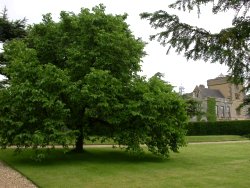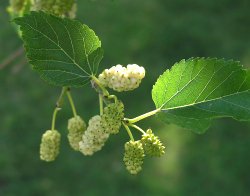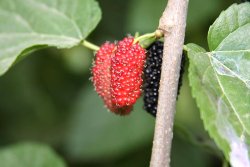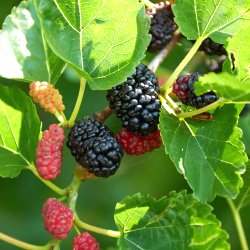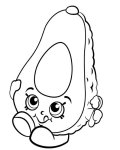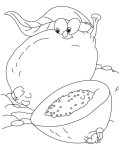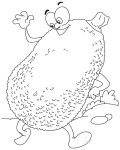
|
Contact usSuper Fruits!
Food For Life
UCT Children's Agricultural CurriculumUCT ProjectsCaribbean Disaster Relief
|
home >>food
for life >>super fruits>>
sycamore Super Fruits - Sycamore (Mulberry)
|
Mulberry Preparation:
Health benefits of Mulberry Fruit: Delicious, fleshy, succulent Mulberries are less in calories (just 43 calories per 100 g). They compose of health promoting minerals, and vitamins that are essential for optimum health. Consumption of Mulberry berries has potential health effects against cancer, aging and neurological diseases, inflammation, diabetes, and bacterial infections. Mulberries are considered as a blood tonic. Mulberries are known to improve blood circulation and are beneficial as an anti-inflammatory that helps to lower the blood pressure and makes you less susceptible to blood clots and strokes. In addition, these berries are an excellent sources of vitamin-C (36.4 mg per 100, about 61% of RDI), which helps the body develop resistance against infectious agents. Mulberries strengthen kidneys and cleanse the liver. Further, the berries also contain small amounts of vitamin A, and vitamin E, in addition to the above-mentioned antioxidants. Consumption of Mulberry provides compounds that help to protect from aging and various disease processes. Mulberry protects the eye from the harmful ultraviolet rays through light-filtering actions. Mulberries are an excellent source of iron, which is a rare feature among berries, contain 1.85 mg/100 g of fruits (about 23% of RDI). Iron, being a component of hemoglobin inside the red blood cells treating anaemia. They also good source of minerals like potassium, manganese, and magnesium. Potassium is an important component of cell and body fluids that helps controlling heart rate and blood pressure. Mulberries are rich in B-complex group of vitamins and vitamin K, and good amounts of vitamin B-6, niacin, riboflavin and folic acid. These vitamins help the body in the metabolism of carbohydrates, protein, and fats. Mulberries are a good source of nutrient that researchers believe prevent cancer. It contains high level of anti-oxidants which stunts the growth of prostrate cells and tumour growth. Health benefits of Mulberry Leaves: What are the benefits for the body? Analysis at the Mulberry Research Center of Thailand found mulberry leaf contains 18 amino acids, minerals and vitamins such as calcium, potassium, sodium, magnesium, iron, and vitamin A-B1-2. The most important ingredients are ‘phytosterol’ and ‘gamma-amino acid’ which help to decrease cholesterol level in the blood and high blood pressure. The magnesium Mulberry leaf tea is essential for functioning of nerves, muscles and maintains normal heart. It increases energy metabolism, strong bones, assist immune system, manage blood sugar levels and maintains normal blood pressure. Traditional Chinese doctors have used mulberry leaf for treatment of fever, coughing and rheumatism, to treat the high blood pressure and high cholesterol. They refer to it as “amazing medicine from heaven.” Weight loss: The mulberry tea prevents the absorption of carbohydrates. It helps the body to flush out the carbohydrates and starches from the body so that they do not turn to glucose. Hunger is reduced by diminishing blood sugar levels. This leads to weight loss. Is Mulberry leaf tea safe? Mulberry leaf tea is a naturally pure herb that is non-toxic and very safe to drink. It is very good for the elderly to drink everyday and can fend off disease. Pregnant women, breast feeding mothers and young children should not drink large amounts unless under the supervision of a qualified professional. Medical disclaimer This information is intended solely for the general information of the reader. The contents is not intended to offer personal medical advice, diagnose health problems or for treatment purposes. It is not a substitute for medical care provided by a licensed and qualified health professional. Please consult your health care provider for any advice on medications. References: CLICK ON THE LINKS BELOW TO LEARN MORE...
SOWING SEEDS OF SUCCESS - MORINGA CURRICULUM SUPER FRUIT CURRICULUM NEW LIFE CURRICULUM
|
| Copyright © 2024 www.UnitedCaribbean.com. All rights reserved. Disclaimer Click to Contact us |



